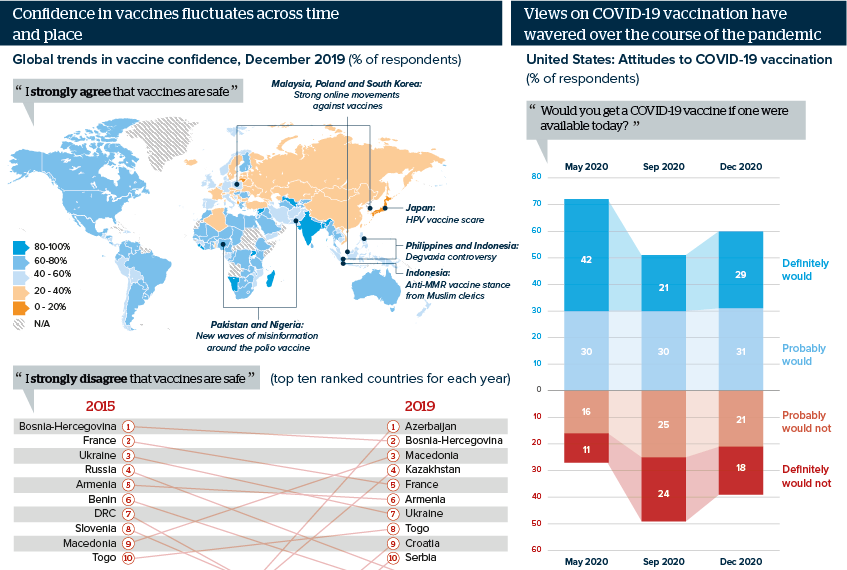COVID-19 vaccine uptake will vary by country
With vaccine roll-outs underway, take-up will be crucial in controlling the pandemic
Source: Simas,C. and de Figueiredo, A. Lancet, Mapping global trends in vaccine confidence and investigating barriers to vaccine uptake: a large-scale retrospective temporal modelling study; Pew Research Center, Intent to Get a COVID-19 Vaccine Rises to 60% as Confidence in Research and Development Process Increases, Dec 3, 2020
Outlook
The willingness of people to take vaccines varies by country and over time. According to a global Lancet study, published in September, the lowest percentages of people strongly agreeing that vaccines were safe in 2015 were in France (8.9%), Japan (8.9%) and Mongolia (8.1%). Vaccine confidence rose between 2015 and 2019 for France, India, Mexico, Poland, Romania and Thailand, but fell in Indonesia, the Philippines, Pakistan and South Korea.
This was the result of controversies linked to vaccines, online anti-vaccination movements or grassroots anti-vaccination rhetoric, political instability and extremism, and general lack of trust in authorities.
With COVID-19 inoculation campaigns having started in the United Kingdom, United States and Canada, vaccine take-up will be crucial in bringing the pandemic under control. Countries with low trust in vaccines may struggle to achieve herd immunity.
Impacts
- The pandemic and lockdowns may increase people’s willingness to get vaccinated in general, including for the annual flu vaccination.
- Robust vaccination campaigns are nonetheless likely to be needed to challenge misinformation about vaccines.
- Celebrity endorsement of vaccinations could help combat vaccine hesitancy.
See also
- Greek government will be firmer on COVID vaccination - Oct 15, 2021
- COVID-19 controls across the Gulf tighten regime grip - Aug 25, 2021
- Vaccines will be slow to reach the Sahel’s rural areas - Jul 5, 2021
- Organised crime will gain from world vaccine shortages - Jun 22, 2021
- Vaccine delays will hold back Thai tourism revival - Feb 16, 2021
- COVID vaccine data confusion will feature in politics - Feb 4, 2021
- Ambitious Argentine vaccine targets may not be met - Jan 19, 2021
- Emirates position to become global vaccine hub - Jan 19, 2021
- Sinovac issues may limit Latin American vaccine uptake - Jan 13, 2021
- Balkan public distrust will endanger vaccine take-up - Jan 11, 2021
- Vaccine fears may limit uptake in Brazil and Argentina - Dec 24, 2020
- Controversies could fuel COVID-19 vaccine hesitancy - Dec 7, 2020
- More graphic analysis
